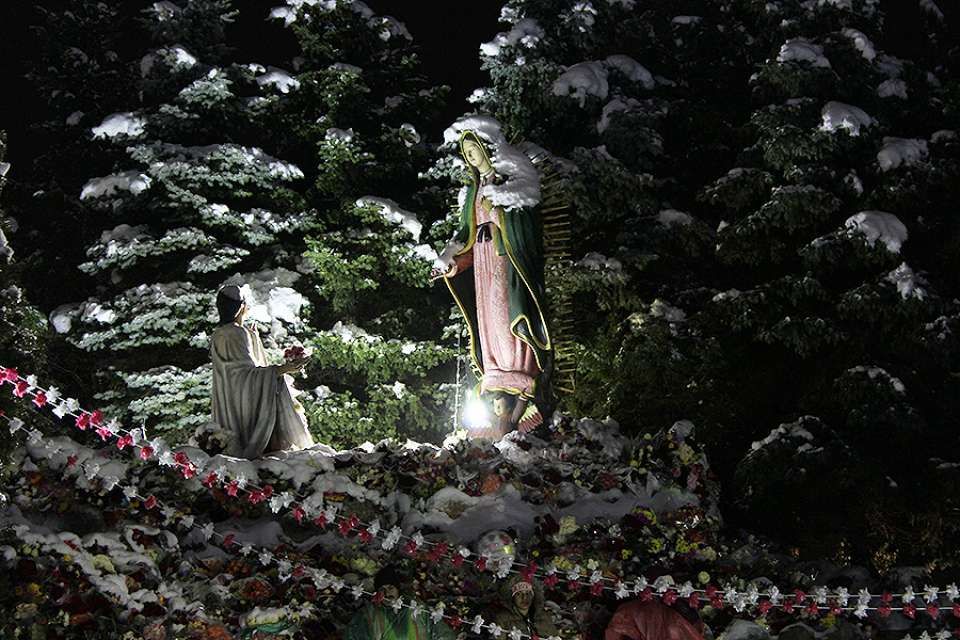Marian devotion is intense among the hundreds of thousands of people who visit the Shrine of Our Lady of Guadalupe each year on her feast day.
Not just her shrine in Mexico City. The Virgin of Guadalupe has a major place of honor in Des Plaines, Ill., a Chicago suburb.
“People make the journey to come, and they leave their flowers and their offerings. They light a candle,” said Father Esequiel Sanchez, rector of the Shrine of Our Lady of Guadalupe. “They want to get here, they want to get to her. When you talk to the pilgrims, you see the genuineness of the people’s faith.”
Last year, despite cold and snow, 250,000 people visited the shrine for the Dec. 12 feast day, Sanchez told CNA. The shrine draws over 1 million pilgrims each year.
While most pilgrims arrive by vehicle, many people walk to the shrine either from Chicago or throughout the Midwest as a sign of devotion or mortification.
“They walk miles to arrive,” said Fr. Sanchez. They each have a story to tell. A 2016 pilgrim walked on his knees part of the final two-and-a-half miles to the shine.
People like him will say “my daughter’s sick, and I want Our Lady to help,” the priest recounted, adding: “the extreme of the expression only indicates the extreme of the concern for their petition.”
The shrine hosts a digital replica of the image of Our Lady of Guadalupe. It is the most visited U.S. shrine to Our Lady of Guadalupe, and the second most-visited in the world after Mexico’s Basilica of Our Lady of Guadalupe.
Its origins date to 1987, when a group of Chicago-area Catholics decided to launch a mission to promote devotion to Our Lady of Guadalupe using a special pilgrim statue from the shrine in Mexico City.
In 1995, construction began on an outdoor shrine in Des Plaines modeled after Tepeyac Hill in Mexico City, where the Virgin Mary appeared to the indigenous Mexican St. Juan Diego in 1531. The Virgin Mary left her image on his cloak, known as a tilma, and asked him to build a church on a hilltop.
The apparition helped inspire mass conversions of indigenous people to Christianity.
While devotion to the Guadalupe Marian apparition is strong among Mexicans and Mexican-Americans, Fr. Sanchez said other Catholics in America are “beginning to appreciate her a little more, and honor her.”
“I think American Catholics are looking at the story itself, and how much it sounds like the gospel,” he said.
The Catholic hierarchy in the U.S. is promoting Our Lady of Guadalupe, and she has become an image for the pro-life movement as well as for women’s issues, the priest noted. Other ethnic groups are growing in devotion to her, including the Indian and Polish communities.
Sometimes the mortifications of the pilgrims are extreme. In severe cold weather, senior citizens will still walk through the snow.
“Here we don’t judge them. We just get them to Our Lady,” Sanchez said. “Our job is to make sure you get there safely.”
Sometimes safety is a concern.
Once, a group of pilgrims traveled on foot through the northern Illinois city of Rockford on their way to the shrine. They were holding a banner and singing songs. A group of people voicing anti-immigrant attitudes began to assault them, told them to get out of the neighborhood, and threw rocks at them.
“It’s not necessarily a wonderful experience,” Sanchez said. “They continued their pilgrimage and made it.”
The priest suggested the pressures of contemporary American culture also drive devotion.
“Whatever the country is feeling, the community is looking for hope,” he said. “We live in a time when people feel less welcomed, where people feel scared, and often the only thing they feel they can trust is their prayer, and the one thing that has got them through the hardest times of their lives thus far: Our Lady of Guadalupe.”
The feast day can create a major traffic issue, with 300,000 people in a 36-hour period. Planning begins months in advance, with the local police department helping to manage the situation.
There are 150 to 200 volunteers just to care for the pilgrims Dec. 11-12.
“Our job is to take care of the pilgrims when they come. They are trying to get to her,” Sanchez said, adding that they aim to help the pilgrims feel loved and well-fed.
“We make sure that the people’s experience is one that is very, very festive,” he said. “There’s a lot of music, a lot of serenading mananitas, a lot of indigenous dancing, what you see in other shrines.”
Sanchez said there is a strong custom in Mexican Hispanic culture of “mandas,” which means “promises” in English.
“People make promises to Our Lady of Guadalupe for a specific intentions or miracles or an act of gratitude,” he said.
“The problem is a lot of people here in the U.S. can’t go back to Mexico. There are immigration issues, economic issues, health issues, there are a lot of issues that keep them from going to Mexico City to fulfill their life’s promise to Our Lady.”
To help these pilgrims fulfill their promises, the Basilica of Our Lady of Guadalupe in Mexico City has offered them the same graces and indulgences if they visit the Illinois shrine.
Other pilgrimages come during the novena, the nine days before the feast day.
“On the ninth, we have a pilgrimage of truckers,” Sanzhe said. “They bring their tractor trailers, the truck, just the cab… and they decorate their trucks and they come to the shrine and they have a special Mass in which all their trucks get blessed.”
About 300 horseback riders come through for a separate blessing.
Devotees even organize through their occupations. The local landscapers’ union sought a special blessing and a Mass.
“It’s wonderful to see they’re finding Our Lady of Guadalupe, and how much that really helps them,” the shrine’s rector said.

